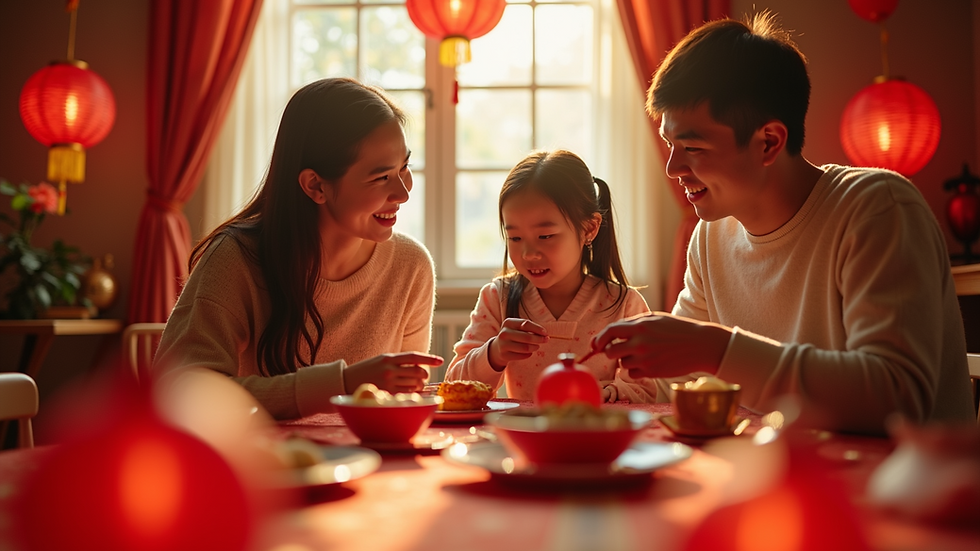#1: Placeholder
- Gabriel Pelletier
- 1 day ago
- 4 min read
Updated: 10 hours ago
China is a land rich in history and culture. With over 5,000 years of civilization, it boasts a variety of traditions that reflect its diverse heritage. From festivals to family customs, each aspect of Chinese culture tells a story. In this blog post, we will explore some of the most fascinating Chinese traditions that continue to shape the lives of millions today.
The Importance of Family
Family is at the heart of Chinese culture. The concept of filial piety, which emphasizes respect for one's parents and ancestors, is deeply ingrained in society. This value influences many aspects of life, including education, career choices, and social interactions.
In traditional Chinese families, it is common for multiple generations to live under one roof. This arrangement fosters strong family bonds and ensures that elders are cared for. Family gatherings, especially during festivals, are significant events where members come together to celebrate and honor their heritage.
Festivals and Celebrations
Chinese festivals are vibrant and full of life. They are a time for families to reunite and celebrate their culture. Here are a few of the most important festivals:
Chinese New Year
Chinese New Year, also known as the Spring Festival, is the most celebrated holiday in China. It usually falls between late January and mid-February. The festival lasts for 15 days and is marked by various customs, such as:
Reunion dinners: Families gather for a feast on New Year's Eve.
Red envelopes: Elders give children red envelopes filled with money for good luck.
Fireworks: Fireworks are set off to scare away evil spirits.

Mid-Autumn Festival
The Mid-Autumn Festival, also known as the Moon Festival, is celebrated on the 15th day of the eighth lunar month. It is a time for families to come together and admire the full moon. Key traditions include:
Mooncakes: These round pastries symbolize reunion and are shared among family members.
Lanterns: Colorful lanterns are lit and displayed, adding to the festive atmosphere.
Dragon Boat Festival
The Dragon Boat Festival occurs on the fifth day of the fifth lunar month. It commemorates the ancient poet Qu Yuan. The main activities include:
Dragon boat races: Teams paddle in unison to compete in races.
Zongzi: Sticky rice dumplings wrapped in bamboo leaves are prepared and eaten.
Traditional Chinese Medicine
Traditional Chinese Medicine (TCM) is an ancient practice that has been used for thousands of years. It focuses on balancing the body's energy, known as "qi." TCM includes various treatments, such as:
Acupuncture: Inserting thin needles into specific points on the body to relieve pain and promote healing.
Herbal medicine: Using natural herbs to treat various ailments.
Tai Chi: A form of gentle exercise that promotes relaxation and balance.
Many people around the world are turning to TCM for its holistic approach to health. It emphasizes prevention and the importance of maintaining harmony within the body.
Calligraphy: The Art of Writing
Chinese calligraphy is a revered art form that combines beauty and meaning. It is not just about writing; it is a way to express emotions and convey thoughts. Calligraphy uses brush and ink to create characters that flow gracefully on paper.
Learning calligraphy requires patience and practice. Each stroke has significance, and the final piece reflects the artist's personality. Calligraphy is often displayed during festivals and special occasions, showcasing the beauty of the Chinese language.
Tea Culture
Tea is an integral part of Chinese culture. The Chinese have been drinking tea for thousands of years, and it plays a vital role in social interactions. There are several types of tea, including green, black, and oolong, each with its unique flavor and health benefits.
Tea Ceremonies
Tea ceremonies are a traditional way to serve tea. They emphasize respect and appreciation for the beverage. During a tea ceremony, the host carefully prepares and serves tea to guests, creating a serene atmosphere. This ritual is not just about drinking tea; it is about fostering connections and enjoying the moment.
The Influence of Confucianism
Confucianism has significantly shaped Chinese culture and values. Founded by Confucius, this philosophy emphasizes morality, social relationships, and justice. Key principles include:
Respect for elders: Elders are revered and their wisdom is valued.
Education: Learning is highly regarded, and education is seen as a path to success.
Harmony: Maintaining harmony in relationships is essential for a peaceful society.
Confucianism continues to influence modern Chinese society, guiding personal behavior and social interactions.
The Role of Festivals in Modern Society
While many Chinese traditions have ancient roots, they continue to thrive in modern society. Festivals are not only a time for celebration but also a way to preserve cultural heritage. Young people often participate in traditional activities, ensuring that these customs are passed down to future generations.
In urban areas, festivals have adapted to contemporary life. For example, large-scale celebrations may include concerts, performances, and art exhibitions, attracting people of all ages. This blend of tradition and modernity keeps the spirit of Chinese culture alive.
Conclusion: Embracing the Richness of Chinese Traditions
Chinese traditions offer a glimpse into a rich and diverse culture. From family values to vibrant festivals, each aspect reflects the history and beliefs of the Chinese people. As we explore these customs, we gain a deeper understanding of what makes Chinese culture unique.
By embracing these traditions, we not only honor the past but also enrich our own lives. Whether through family gatherings, tea ceremonies, or the beauty of calligraphy, there is much to learn and appreciate. As we celebrate these customs, we connect with a culture that has stood the test of time, reminding us of the importance of heritage and community.


Comments